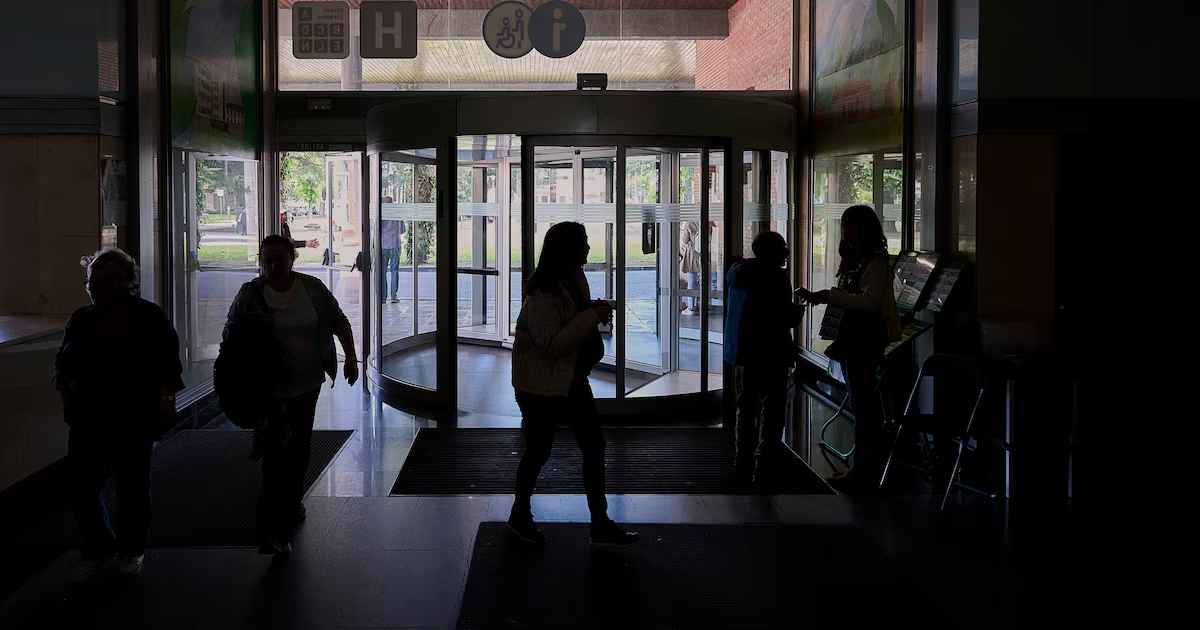Sharp swings in power caused a network outage that left most of Spain and all of Portugal in the dark on Monday, making it in the worst blackout in Europe in years.
While some areas across Spain gradually came back online in the afternoon, restoring all supply in the country will take until at least the evening, according to grid operator Red Electrica. The outage was due to sudden changes on the network, known as “oscillations,” said Eduardo Prieto, the company’s director of services, declining to comment further on the causes.
“For the moment, the investigation seems to point out to a technical/cable issue,” the European Union Agency for Cybersecurity said in an emailed statement, but added that it’s “closely monitoring” the situation and is in contact with national and EU authorities.
The two countries lost power shortly after 12:30 p.m. local time, with the blackout impacting public transport, airports and phone services. Data from Red Electrica showed power demand in freefall shortly after noon, dropping more than 10 gigawatts — more than a third of the country’s total electricity usage for the day. The sudden outage caught out millions of people.
Get the latest breaking news from North Texas and beyond.
A countrywide blackout is very unusual for any European country. In 2003, Italy saw the worst power cut in more than half a century when a breakdown of electricity lines from neighboring countries impacted the whole country, except for the island of Sardinia. In 2019, a major outage hit London when a gas plant and an offshore wind farm went offline almost simultaneously.
Spanish Prime Minister Pedro Sanchez and Deputy Prime Minister Sara Aagesen held an emergency meeting at the headquarters of Red Electrica as they sought answers.
 People try to board a crowded bus after the subway stopped running following a power outage in Lisbon, Portugal, Monday, April 28, 2025. (AP Photo/Armando Franca)(Armando Franca / AP)
People try to board a crowded bus after the subway stopped running following a power outage in Lisbon, Portugal, Monday, April 28, 2025. (AP Photo/Armando Franca)(Armando Franca / AP)
“I ask all people in Madrid to absolutely minimize movement,” José Luis Martínez-Almeida, the city’s mayor said in a statement on social media. “The traffic lights are down at the moment and it’s essential that emergency services can circulate.”
An excess of solar generation in the grid could have contributed to the incident. Spain has reported an unprecedented number of hours with negative power prices in recent months as more solar and wind power gets injected into the grid. Still, the oversupply of power hasn’t previously caused blackouts in the country.
French grid operator RTE said it had supplied 700 megawatts of power to Spain and was ready to raise that to 950MW once the network was able to receive it. Households in the French Basque Country suffered a blackout for a few minutes until electricity was restored.
The stock market operated normally in both countries, with Spain’s Ibex35 trimming earlier gains shortly after the blackout hit. The country’s antitrust agency CNMC delayed a decision over BBVA SA’s bid to buy Banco de Sabadell SA due to the blackout, news agency Efe reported, citing unidentified people with knowledge of the matter.
At this stage, a cyber attack hasn’t been entirely ruled out, according to people familiar to the situation. Investigations are ongoing as authorities work to restore the network.
Public transport, traffic lights and phone services were mostly down in parts of Madrid, Barcelona and Lisbon due to the outage, while trains were mostly halted. The main Madrid airport has cautioned that it’s experiencing a high degree of delays.
Dylan Fraser, a US national from Virginia, went to the airport in Lisbon to catch a flight back home only to be informed his flight had been cancelled and the airport was closed.
 A medical staffer relocates a patient during a nationwide power outage in Pamplona, northern Spain, Monday, April 28, 2025. (AP Photo/Miguel Oses)(Miguel Oses / AP)
A medical staffer relocates a patient during a nationwide power outage in Pamplona, northern Spain, Monday, April 28, 2025. (AP Photo/Miguel Oses)(Miguel Oses / AP)
“They told us we had to leave,” he said as he sat at the bar of the Sofitel Hotel in downtown Lisbon. “I have no idea when I will be able to go back.”
Spain’s Canary and Balearic Islands were unaffected, but on mainland Spain companies sent workers home and the streets of major cities quickly filled with people as police directed traffic.
In Madrid, the metro was evacuated and office workers filled the city’s financial district, while ambulances raced through the main thoroughfare Castellana Avenue, where traffic agents used speakers on cars to direct vehicles and people. ATMs in the city center were not working.
“This is very weird and unsettling,” said Ana López, who works at the Castellana financial area and was exiting her office building after her employer sent all staff home.
By Laura Millan, Macarena Munoz Montijano, Thomas Gualtieri, and Daniel Basteiro, Bloomberg News
With assistance from John Ainger and Clara Hernanz Lizarraga



